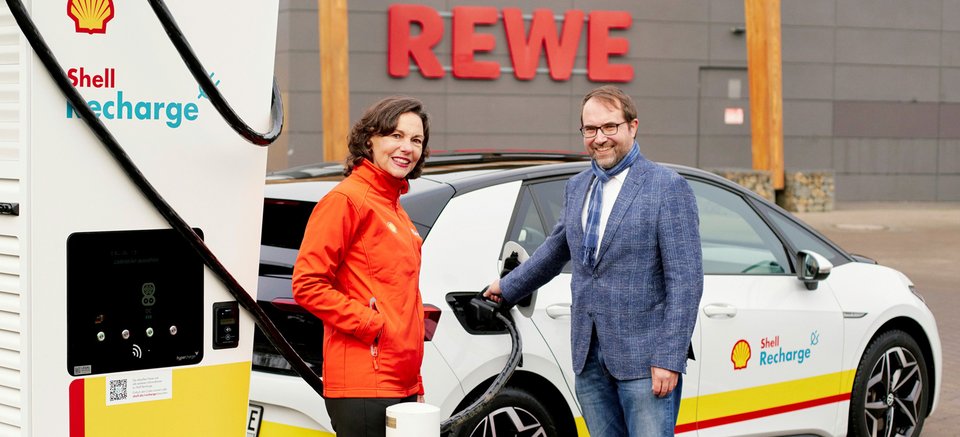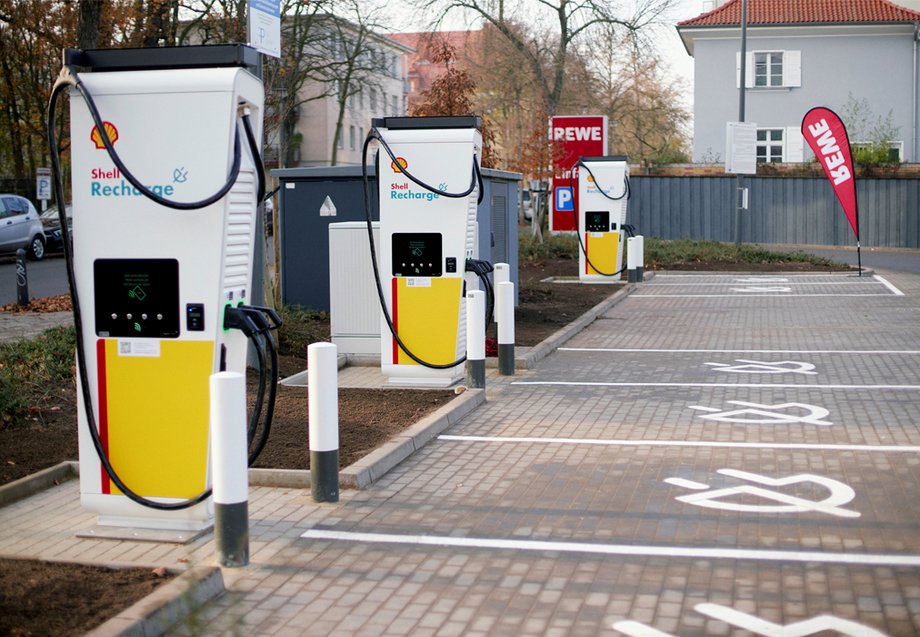
Shell Deutschland GmbH and the REWE Group have jointly put the first largest format of Shell Recharge fast-charging stations into operation at a REWE store in Berlin.
Customers of the REWE supermarket on Konrad-Wolf Straße can now charge their e-cars at a total of six charging points while they shop, with a choice of ultra-fast (up to 300 kW) or fast (up to 150 kW) charging. The location in
Berlin is one of 400 REWE supermarkets and PENNY discounters nationwide that will be equipped with Shell Recharge charging stations powered 100 per cent by green electricity in the coming years.
With this initiative, both companies want to promote the energy transition and make it easier for drivers to switch to an electric vehicle.
Charge anytime, anywhere
Linda van Schaik, General Manager Mobility DACH and responsible for Shell's petrol station business in Germany, Austria and Switzerland, said: "We greatly appreciate the long-standing and trusting cooperation with the REWE Group. We share the same values and want to work together to provide an even better shopping experience. We know that customers have different needs. We want to be the partner of choice and offer charging solutions wherever and whenever customers want them - in a car park in front of the supermarket, at the streetlamp, at home in the garage, at work, on the road or at our petrol station."
„The retail sector plays a key role in the ramp-up of e-mobility for everyday use.“


Telerik Shishmanov, CFO of REWE Group, adds: "The retail sector plays a central role in the ramp-up of e-mobility for everyday use. REWE Group is working with strong partners to expand the charging options at our stores. We are expanding our e-infrastructure with the fast-charging points from Shell: this additional offer makes everyday life much easier for our customers and employees. Furthermore, fast-charging points are another strong incentive to shop locally, which we are happy to offer our customers. As part of our own climate ambitions, we are planning to install a total of 6,000 charging points at existing owner-occupied and rental properties as well as new buildings across Germany by 2025. Our partnership with Shell is making an important contribution to this."
Fast charging in Austria too
Shell, the REWE Group and its subsidiary Lekkerland have been working together for a long time in several stores in Europe. The "BILLA stop & shop" shop concept has been in operation at Shell petrol stations in the Czech Republic since 2014. In 2018, the "BILLA Unterwegs" shop format was introduced at Shell petrol stations in Austria, and in October 2022, the two companies announced that they would intensify their collaboration and set up a fast-charging infrastructure at at least 100 BILLA, BILLA PLUS, PENNY and BIPA locations.
Goal: zero emissions by 2050
Shell wants to become a company with net-zero CO2 emissions by 2050. One building block for this is the development of a wide range of charging points for electric vehicles. The charging points now planned at supermarkets are intended to complete the range of charging points for people on the move. Shell's global target is to install over 500,000 charging points by 2025 and over 2,500,000 by 2030.
E-mobility on the rise
In the third quarter of 2022, battery-powered vehicles recorded the strongest growth of all vehicle types (+22.0%) with 259,449 units registered in the EU. Experts assume that this trend will continue to accelerate. It is therefore important that the expansion of the charging infrastructure for electric vehicles keeps pace.

Both German and English comments appear here.
This is the right approach (but currently only works during the day when there is plenty of sunshine), but the first step has been forgotten here. The most important point in this context: energy generation/supply security. This is not really guaranteed now (blackout danger/risk) and then there is a not inconsiderable additional demand for the desired e-mobility? Furthermore, with our current demand, much of the energy required is already being generated with fossil fuels (gas + coal and old nuclear energy). Since the demand here is high, especially at night, and will probably continue to rise (for charging electric vehicles in domestic garages). The average CO² emission per kWh is more than 250 g, at night more than 600 g! In addition, there is the considerable additional demand for the retrofitted and planned heat pumps ( heating replacement / modernisation ( the phase-out of fossil fuels is also being subsidised by the state ). Unfortunately, our politicians ( government parties ) are euphoric / naive / lacking a concept!instead, there are "adverts" on TV about how we as private households should / can / must prepare for a "blackout" and the Federal Chancellor also signs a "supply contract" for electrical energy (we supply!!) with our French neighbours! Schizophrenia to the power of five what is going on at the moment. sorry